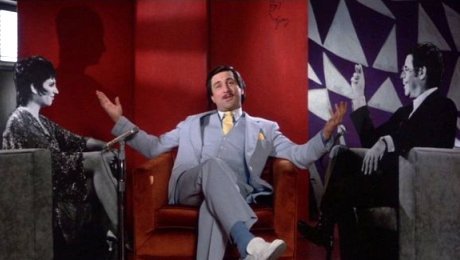Some years ago, I began reading Martin Scorsese’s 1983 King of Comedy in a very different way. I stopped seeing it as merely a fantasy about one man living out America’s dark obsession with fame. It was (almost definitely by accident) a prophetic film about the rise of the fan, the storming of the gates, the decentralization of the media. It unwittingly told us that democracy was about to get much more democratic, which would be both boon and bane. The world was to be a more open and less-stable place, and the ramifications would impact politics just as readily as it would pop culture. As Rupert Pupkin stood nervously on the stage at film’s end, a recognition comes over his nervous face, the realization that it might be hard to maintain his footing on the earth he helped shift.
The Internet has aggressively trolled professionalism of all kinds. The faceless, unpaid crowd is now sufficient. We’ll do. I mean, if the Encyclopædia Britannica and its grand tradition could be swept from the shelf by a band of Wikipedians, what was safe? For all the early flak absorbed by Jimmy Wales’ site, it became undeniably a wonderful thing, but it proved to not be complementary.
An astute critic like A.O. Scott knew what was happening as the pieces were just beginning to move. He seems to have learned to stop worrying and love the bomb. (Of course, you might ask, what choice does he have?) Scott’s career may be regarded as redundant in a society that loves Likes, but he has enough generosity to appreciate the good aspects of such a new normal, even if something has been lost in translation. Populism has its price.
The excellent Daniel Mendelsohn evaluates Scott’s Better Living Through Criticism for the NYT “Sunday Book Review.” He feels that on some level Scott’s egalitarian impulses are forced. An excerpt:
The problem here isn’t just one of tone or style — although a writer of Scott’s standing should know that both are crucial tools in the critic’s belt. Rather, you sense that the faux-populist diction doesn’t reflect this author’s real allegiances, which are evident in the works he selects for his loving and expert analyses: Rilke and Philip Larkin, Picasso and Henry James. (James’s 1877 novel The American, which begins with a scene in which a successful American businessman is overcome by tiredness in the Louvre, provides an amusing early example of “museum fatigue,” a phenomenon that the author investigates during a stimulating and subtle discussion about the difficulty of achieving “innocent” responses to art.) The admiring references you get here to hip-hop feel dutiful rather than deeply felt — attempts to demonstrate his pop bona fides.
So too with the halfhearted assertion — the focus of an entire chapter — that “it is . . . the job of the critic to be wrong.” To be sure, critics often turn out to be wrong, as Scott wittily reminds you during a recitation of some notorious critical gaffes: early and wince-inducing takedowns of John Keats’s poetry, of Moby-Dick, of Bringing Up Baby. But those errors of individual taste — the most crucial, if indefinable, qualification for serious criticism, along with expertise, both of which Scott (who has both) avoids talking about at length, as if to do so would offend the Amazon-rankers and cyber-tomato-throwers in his audience — are hardly proof that the critic’s duty is to be “wrong.” The critic’s job is to be more educated, articulate, stylish and tasteful — in a word, more worthy of “trust” — than her readers have the time or inclination to be; qualities eminently suited to a practice that (as Scott rightly if too glancingly points out) has validity and value only if it is conducted in public.
Whatever its occasional pandering, Better Living Through Criticism mostly exemplifies the rhetorical virtues it so enthusiastically celebrates as being peculiar to the critic: attentiveness to detail, alertness to context, a hunger for larger meanings. The critic, Scott declares in the book’s final dialogue, is “a person whose interest can help activate the interest of others.” In an era of reflexive contempt for erudition, taste and authority, qualities that Scott is perhaps too hesitant to name as the sine qua non of great critics, it is no mean feat to help activate, as this book will surely do, an interest in the genre of which he and others of his generation may be the last professional practitioners.•
Tags: A.O. Scott, Daniel Mendelsohn

